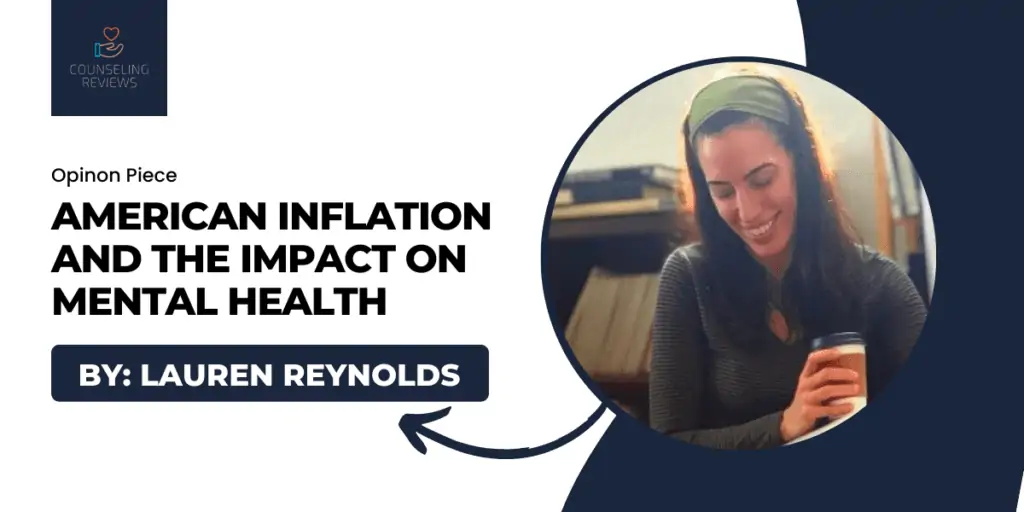We write our honest reviews but this page may contain affiliate links, with some of the partners mentioned, to support this website. Read more here
US inflation rates in America is at an all-time high, impacting everyone, with the hardest hit populations belonging to the middle and lower socio economic classes.
There have been many studies regarding the correlation between poverty and mental health, as well as studies examining housing and shelter costs and general economic hardships’ impact on well-being.
Here we will look at some very revealing surveys indicating how Americans are rating their mental health in relation to the current economy, what type of mental health issues may materialize, and how one might find support in these difficult economic times.

Why is Inflation so stressful?
Inflation can be stressful due to several reasons. First, it erodes the purchasing power of individuals, making it harder to afford basic needs and maintain the same standard of living. Rising food prices also can lead to financial uncertainty, causing anxiety about future expenses.
Core inflation can also disrupt long-term financial planning and savings goals. Additionally, the fear of not being able to keep up with annual inflation rate or falling behind economically can create a sense of helplessness and insecurity, contributing to overall stress and mental strain.
How Americans are Being Impacted by the Current Economy
The following statistics are from a survey conducted in May of 2022, consisting of 5,000 Americans respondents, executed by Lifeworks, a digital and in-person human resource solutions-focused company.
“Twenty percent of Americans are unable to meet basic needs due to rising interest rates. Of that 20%, respondents report a mental health score 16 points below the national average. Fifteen percent of respondents indicate they are uncertain whether their households will be secure next year, after annual inflation, and 48% of people have cut back on their spending.” (MacDonald, 2022)
These statistics indicate a significant country portion of the American population is teetering between poverty, financial instability, or potentially, entering a lower economics. Just as people are starting to rejoin their communities and establish a sense of normalcy post-pandemic, new stressors have arisen in markets due to significant inflation increases.
The correlation between economic hardship and mental health
There has been a lot of research indicating the direct correlation between poverty and mental health.
In the Journal of Psychiatric Times, doctors conclude, “poverty is one of the most significant social determinants of health and mental health. Poverty in adulthood is linked to depressive disorders, anxiety disorders, psychological distress, and suicide.” (Kevin Simon MD, 2018)
Economic instability typically has a domino effect on people’s circumstances.
For example, someone who has been laid off might need to relocate, their children may need to switch schools, their health insurance may be impacted, they may lose the support of their community, and so on. Any type of change can be stressful, even positive change, therefore the impact of multiple changes caused by financial insecurity can profoundly affect someone’s psyche.
The hierarchy of human needs
Abraham Maslow was an American psychologist whose theories became popularized during the mid-century. One of those theories was the hierarchy of human needs, which Maslow believed to be relatively universal among most cultures.
Just like the food pyramid, his hierarchy is often demonstrated in a pyramid format with the most essential human needs on the bottom requiring satisfaction, prior to other needs being fully met.
Physiological needs are listed at the bottom of the pyramid, suggesting they are of the greatest importance. Such needs include water, food and energy, shelter, clothing, sleep, and reproduction. The next most important human need is safety. Safety includes personal safety, shelter, employment, health, and resources.
Above these two core needs resides love and belonging, esteem, and self-actualization.
If your most basic demand can not be met, such as food and shelter, this theory suggests feeling loved, belonging to a community, self-respect, and self-actualization, will all be negatively impacted or even unattainable. This may then result in feelings of isolation, depression, and anxiety.
What to do about your mental health if the economy is impacting you
Unfortunately, when the economy is severely impacted, social services and government-funded programs are also impacted. Though services may be stressed in your community, this doesn’t necessarily mean they lack the resources to help.
Often, programs in your area work with many different agencies and therefore can help you make connections to service multiple needs.
Outside of government-funded programs and non-profit centers, there are churches, synagogues, and mosques that do a lot of interfaith work together to support one another’s communities.
To find community assistance in your area, a good place to start is here: https://www.211.org or you can dial 211 to be connected to local resources.
Another option may be to talk with an online therapist as they are more affordable and don’t involve additional costs of commuting. Most counselors, therapists, and particularly social workers are well-versed in community outreach programs nationally and locally. They can provide you with educational resources in addition to supporting your mental health needs.
Coping with Inflation: Preserving Mental Well-being
Inflationary periods can be stressful and impact mental health. Here are some strategies to help cope with the effects of inflation on a mental health level:
-
Financial Planning: Calculate a budget, prioritize essential expenses, and explore ways to save money.
-
Seek Support: Talk to friends, family, or support groups about your concerns and experiences. Sharing your feelings can provide emotional relief.
-
Self-Care: Prioritize self-care activities such as exercise, relaxation techniques, and maintaining a healthy lifestyle.
-
Focus on What You Can Control: Concentrate on aspects of your life within your control, like personal growth, learning new skills, or finding alternative income sources.
-
Seek Professional Help: Consult with mental health professionals who can provide guidance and support tailored to your specific needs.
Remember, your mental well-being is crucial, and reaching out for support is a sign of strength and resilience during challenging times.
Conclusion
These are difficult times for a lot of people and having just survived the past two years of the pandemic, there is a lot of elevated stress throughout our communities about consumer prices.
The good news for consumers is, many economists, including Ben Bernake, former chairman of the Federal Reserve, do not believe inflation will be as impactful as it was during the 1970s. (Bernake, 2022)
Though we cannot predict what the economy will do with 100% certainty, history has shown us that with modernization, our economy appears to recover quicker than it did during the Great Depression and in the 1970s recession. Let’s hope this moment in time will be fleeting and America will recover soon. In the meantime, if you need support, please reach out for assistance.
There is no shame in asking for help and please know, you are not alone.
Inflation FAQs
Inflation is caused by various factors, including an increase in the consumer price index (CPI) over a given period, such as the month of June. Price Index (CPI) is a measure of the average change over time in the prices paid by urban consumers for a market basket of consumer goods and services. When the CPI rises, it indicates a general increase in the prices paid for goods and services, leading to inflationary pressures in the economy.
Inflation erodes purchasing power, reducing the value of money over time. As prices rise, the same amount of money buys fewer goods and services, lowering the standard of living for individuals and households.
Yes, inflation can be controlled through various fiscal and monetary policy measures. Central bank, such as the Federal Reserve bank, can adjust interest rates and implement open market operations to influence the money supply and manage inflation. Governments can also use fiscal policies like taxation and government spending to control inflation. A combination of higher interest rates, easing supply chain constraints and tighter credit has helped tame inflation in 2023.





